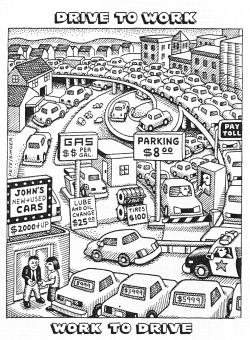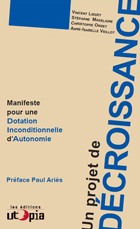 In 1989, Michael Moore presented Roger and Me, one of his first documentaries. The director, disgusted by the suppression of 30 0000 jobs in his native town Flint, embarks on the search for the culprit: the managing director of General Motors, Roger Smith… Throughout the entire movie, we see the downfall of a city slowly sinking into misery, despair, evictions, to suicides, and we witness the destruction of the social and familial fabric.
In 1989, Michael Moore presented Roger and Me, one of his first documentaries. The director, disgusted by the suppression of 30 0000 jobs in his native town Flint, embarks on the search for the culprit: the managing director of General Motors, Roger Smith… Throughout the entire movie, we see the downfall of a city slowly sinking into misery, despair, evictions, to suicides, and we witness the destruction of the social and familial fabric.
The city attempts all possible and imaginable stimulus plans….but it keeps on sinking !
Now, after twenty years of misery, exclusion, and violence … the harsh consequences of this ongoing recession, a successful recovery has not occurred. But over the last few years, the world center of the car industry: the region from Flint to Detroit, has been enjoying an unexpected revival, a transition towards post-industrial, as shown, among others, in the web-documentary by two French journalists: “The culprits are many but the productivist 20th century, born and dead in Detroit, gives a partial response to this downfall.” The citizens of Detroit were the first casualties of this delusional exponential growth: today they are drawing their lessons: there are building tomorrow’s society from the rubbles of the preceding one. It is not an incident- or pain-free process, it starts slowly but we must talk about it now!”
Endured recession or Degrowth by choice?
Detroit experience and its surrounding regions ought to inspire our unionist friends from Aulnay-Sous-Bois, where Peugeot has just announced that they will close a factory where 8 000 people are employed. It should bring our new President and his Industry Minister (just recently renamed: Minister of productive recovery: a beautiful anachronism, to which we should add “green” to turn it into a communication model), but also the Seine-Saint-Denis local representatives to start asking questions: either we stay within the same fictitious to start asking questions productive paradigm, as in Detroit and its surrounding regions, and we keep on going deeper into this recession, or we step aside and avoid the tragic 20 years endured by our American comrades?
Towards an exit from the automobile society!
Rather, Detroit’s disaster could be, should be educational, therefore, it could be a trigger to start the debate: “What do we produce? How? For what purpose? Applying these questions to the car industry gives us an immediate and clear answer: reconversion!
The car is the symbol of the absurdity of our so-called developed societies; it is responsible for our social and cultural ills, notwithstanding the fact that it is leading us into an energy and environmental dead-end.
Absurd? According to Ivan Illich’s data, an average American in the early 70’s, spent around 1 600 hours on his/her car: inclusive of travel times or working hours to pay for it (and this should be higher today given the higher petrol prices). He drove 10 000 kilometers per year; an average speed of 6 km/h… or a walking pace!
A social and cultural impasse? The car is the symbol of both the illusion of the omnipotence of our growth society and the extreme individualism it promotes. It occupies over 50% of our public spaces and we spend a few hours per day in it on average.
An energy and environmental impasse? Peak Oil and climate change, not to mention urban sprawl and the concreting of farm lands… We must get out of this automotive society … or we will be forced into it regardless!
But the car means also factories:
“I have a finger, the index, I can hardly move it, I can’t touch Dominique at night, my hands hurt….My daughter, when I change her nappies….I can’t undo the buttons…. You know, it makes me want to cry in these moments…. It is all that, you understand, writing is painful, I find it difficult to express myself, this too is the result from the production assembly….” Extract from the documentary: Attention danger travail (Warning: danger, work), directed by Pierre Carles, Christophe Coello and Stéphane Goxe in 2003.
For a democratic and serene transition towards sustainable and desirable Degrowth societies
Thus, what is generally happening in the Seine-Saint-Denis and more specifically in Aulnay-Sous-Bois, is an opportunity to initiate transition policies to free ourselves from our dependence on fossil fuels through an open relocalisation of our food, energy and services production.
In a desire to initiate a transition, we propose an ambitious social protection programme:
– The establishment of an Unconditional Basic Income for all the persons laid-off. This income, would be gradually replaced by an Unconditional Autonomy Allowance.
– Funds allocated to families wanting to return to the land, in logic of re-balancing the development of the land and an urban exodus, to revitalise the countryside on the one hand and, on the other hand, to provide support for a sustainable agriculture of proximity.
– The dismantling and the cleaning up of industrial sites, financed by the polluting industries responsible for the damage in the first place.
– Support for local initiatives endorsing the principle of an open relocalisation: return of agriculture in urban settings and implementation of an agriculture of proximity, a local and supportive economy. The setting up of recycling, repair and manufacturing workshops, expansion of a rich and convivial cultural life, education and professional training (permaculture, non-violent communication, bicycle repairs, etc.), citizen participation in the decision-making process and a reappropriation of the democratic tools, etc.
– The implementation of alternative, local and participatory economic systems: local currencies, exchange systems, shared commons and free usage.
Needless to say, companies and their shareholders will contribute to the funding of this collective effort, particularly through to the reappropriation of land and spaces.
What if Aulnay-Sous-Bois became a successful model of democratic and peaceful transition?
Parti Pour La Décroissance
http://www.partipourladecroissance.net?cat=44



Une file d’attente impressionnante devant Foxconn le fabricant chinois qui livre Apple.
Cette file est liée au recrutement en cours pour près de 100.000 emplois chez Foxconn